To achieve the 1.5 C and 2 C global warming goals adopted in the 2015 Paris Agreement, the United States recently announced targets for a 100% carbon-pollution-free electricity sector by 2035, 50–52% reduction in economy-wide emissions by 2030 and net-zero emissions economy-wide by 2050. Achieving these targets will require rapid validation and scale-up of decarbonizing technologies, including carbon capture from fossil-fueled power plants as well as long-duration energy storage to dramatically increase renewable power integration.
DETAIL
One megawatt equals one million watts or 1,000 kilowatts, roughly enough electricity for the instantaneous demand of 750 homes at once.
Southwest Research Institute conducts more than 4,000 research and development projects every year in more than 2 million square feet of offices, laboratories and special facilities at its San Antonio campus. This research consumes electricity on the megawatt (MW) scale. In 2023, staff initiated an internal research program known as Project Z, for zero carbon dioxide emissions, to investigate SwRI as a potential pilot application for implementing net-zero emissions strategies to power its research programs.

SwRI looked at monthly trends in its electric load over the year for weekday and weekend usage. The solid line shows the average, and the envelope indicates monthly minimums and maximums. The bottom row shows diurnal trends in select months with error bars indicating a standard deviation in the load variation at that time of day. The trends are also broken down by weekday and weekend.
Project Z Approach
The project team is analyzing first-of-a-kind net-zero research pilot plant configurations, envisioned as a hybrid microgrid system composed of integrated fossil fuel plus carbon capture and renewable plus energy storage power generation systems. The team is examining the pathway to developing and demonstrating clean energy technologies onsite, which mimic the renewable/storage/fossil fuel dynamics and integration expected to power the future. The project engineers are evaluating systems to ensure reliability for SwRI campus needs. They estimate costs and reduction in carbon emissions to identify future system configurations that reduce environmental impact without increasing the cost of electricity.
SwRI is developing these analysis methodologies into a powerful analysis tool as part of the internally funded research and development program. This flexible, configurable tool maps energy resources to demands by analyzing multiple facility operations, sizing and storage dispatch strategies, outputting useful design metrics including fuel and materials consumption, construction costs, operating costs, and lifetime cost and emissions. Using this tool, the industry can compare a diverse set of renewable technologies against the baseline, providing information needed to select the best low- or zero-carbon solution for meeting energy demands.
As part of the analysis, a research roadmap will define opportunities for future clean energy test capabilities at SwRI. Research pilot plants are essential for technology scale-up, expanding supply chains and advancing operational/control strategies. They also provide long-duration testing and performance validation, build commercial confidence and provide a platform for component and technology development at a relevant scale. Ultimately, the Project Z pilot is envisioned as a behind-the-meter power generation facility at SwRI, deployed in phases, initially establishing a large-scale solar photovoltaic installation followed by a short-duration battery storage solution. The final phase will combine long-duration storage with decarbonized natural gas power generation.
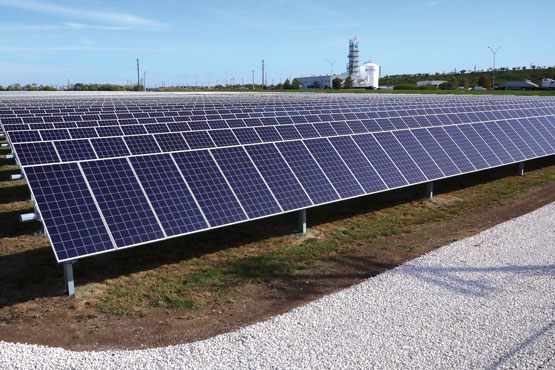
SwRI hosts a solar farm on its grounds to assist the local utility company in studies of decarbonization technologies.
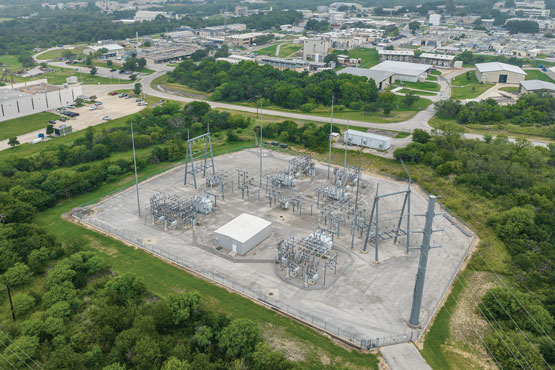
An electric substation supplying power to the Institute offers capabilities to study how to reduce energy and emissions.
Project Z Benefits
The current project is analyzing and evaluating the zero-net emissions energy technologies that can reliably power SwRI’s campus. It’s laying the groundwork for deploying renewable and zero-carbon energy onsite, studying potential cost savings and emissions reductions while exploring the dynamics of grid independence.
DETAIL
Frequency regulation balances electricity supply and demand at all times, particularly over time frames from seconds to minutes. Fast dispatch sources of electrical power can be rapidly accessed or turned on to meet demand.
The team anticipates that Project Z will fuel future research opportunities by providing an industry-accessible research platform for pilot-scale testing and evaluation of new clean energy technologies. The project could establish a blueprint for decarbonizing industrial facilities that can benefit from onsite power generation, energy storage or carbon capture systems. In addition, the pilot can advance behind-the-meter or off-grid energy resiliency for critical and distributed generation applications.
The SwRI campus offers a unique testing ground for this type of research. In addition to having sufficient natural gas/solar resources and previous pilot plant design and construction experience, SwRI has established expertise in energy system research and development, a proven industry collaboration network and an existing behind-the-meter electrical infrastructure that can utilize produced electricity for economical long-duration testing.

SwRI has conducted a range of energy storage demonstration projects, including building and commissioning this first-of-a-kind pumped thermal energy storage pilot facility on its grounds. Developing long-duration, large-scale storage capabilities — such as this facility developed in collaboration with Malta Inc. — will help balance energy volatility and reliability issues associated with integrating renewable sources into the energy mix.
Project Z Future
Project Z is an ongoing internal research and development project with expected completion by September 2023. The project will quantify the trade-offs among various net-zero technologies, guiding future decisions on technology implementations on campus at the MW scale. As a first step, the project team is also working with SwRI Facilities to complete an engineering study evaluating various locations to add solar panels on the grounds.
The team is also developing a flexible and detailed analytical tool that will allow decision-makers to compare a wide set of zero-emission technologies. At SwRI, this includes solar energy generation, battery storage, long-duration energy storage and fossil-fuel generation with carbon capture. This tool and analysis expertise can be extended to future government and industry collaborators, evaluating wind resources, electric load profiles, industrial heat loads and hydrogen production, storage and use.
The project will also identify new challenges in the future of net-zero energy emissions infrastructure. SwRI’s Project Z offers a unique opportunity to understand and test net-zero emissions technology that could, one day, power our way of life.
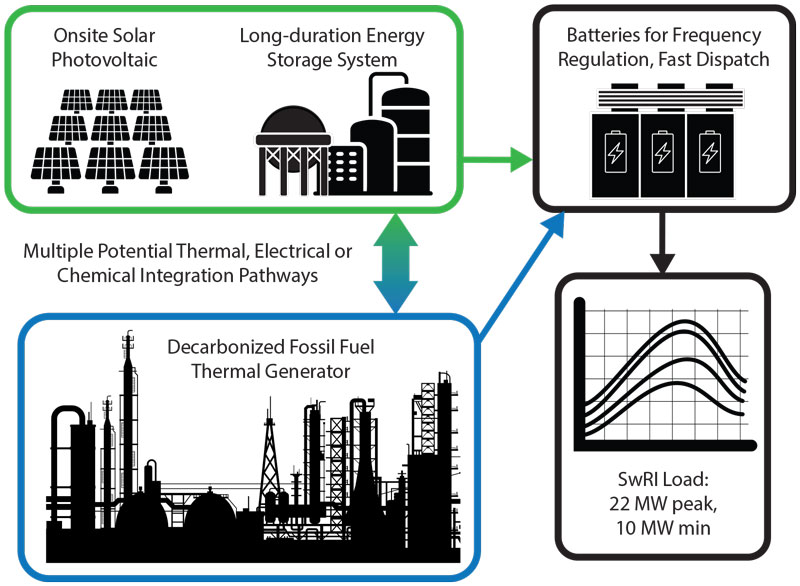
SwRI’s Project Z pilot concept studied decarbonization strategies using conventional and renewable resources, integrating clean fossil fuel technology, long-term energy storage and batteries for frequency regulation and fast dispatch.
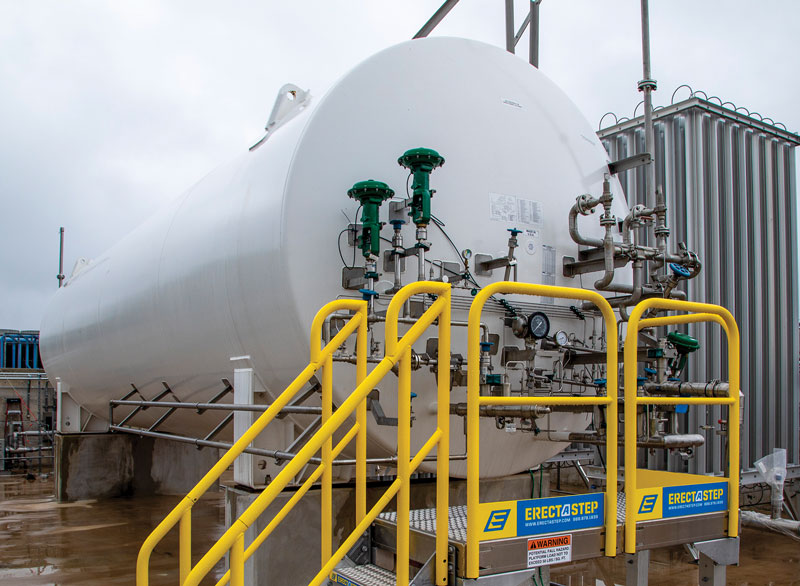
SwRI has installed a large-capacity liquid hydrogen tank to expand its advanced hydrogen energy research initiatives. The tank’s capabilities support multidisciplinary research to leverage opportunities and address obstacles related to hydrogen energy research and development.
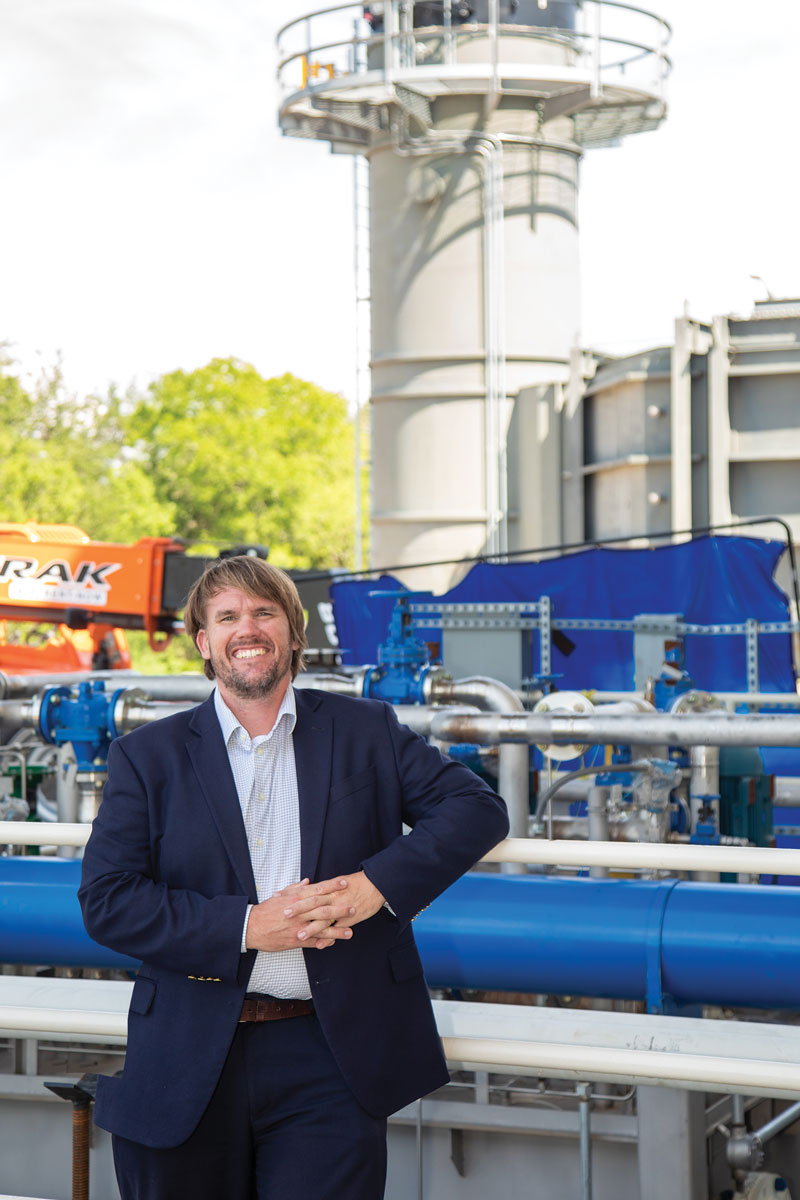
ABOUT THE AUTHOR
Senior Research Engineer Joshua Schmitt specializes in designing energy systems, turbomachinery, heat exchangers and energy storage technology. He applies this expertise to oxy-combustion, carbon capture, hydrogen storage, gas turbines, electrified thermal storage, solar power generation and supercritical carbon dioxide (sCO2) systems and components.
Questions about this story or Project Z? Contact Joshua Schmitt at +1 210 522 6777.

